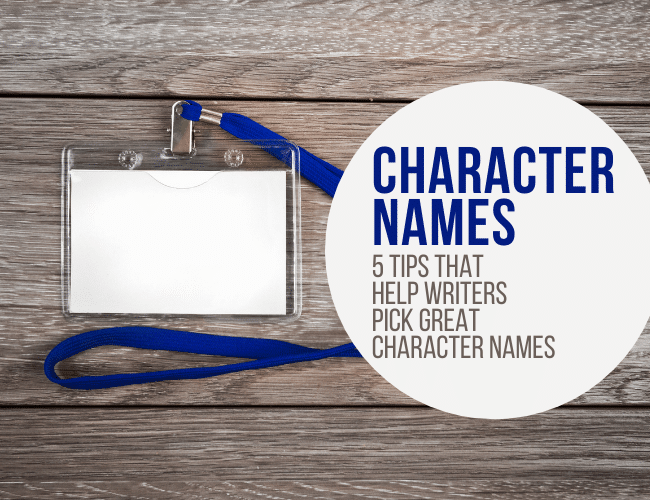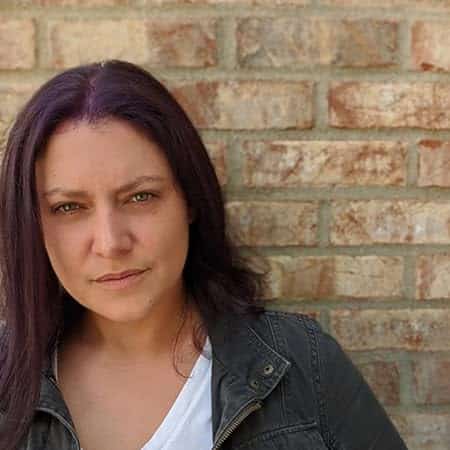Do you spend hours searching for the perfect name for your main character? Do you prefer more common names for you entire cast, but also don't want a name to be boring?

Perhaps you lean on inspiration when naming your story's characters. You opt for a family name. Maybe you pull a random name out of a hat or use a character name generator until you land on a memorable name.
Maybe you're completely stumped when it comes to naming your story's characters, but you're also sick of spending hours stewing over them—you just want to know how to come up with a catchy name fast. One that will be a popular name with your readers, a name that will stay with them as much as J.K. Rowling's Harry Potter cast stuck with hers.
Whatever version of this name searching brought you to this post, one fact is certain: Names — fictional character names or the names of people in real life — are a big deal.
Parents-to-be pore over baby name websites and books for months looking for that “perfect” name. Even naming a pet can take time. You want the name to be perfect, to mean something, to be unique but not too “weird.”
Naming a character, especially in a longer piece of writing, can be just as agonizing and is definitely just as important.
Luckily, I've come up with five tips on naming characters to help you with these important decisions in your writing process.
What's in a Name?
Harry Potter. Bilbo Baggins. James Bond. Katniss Everdeen. Boo Radley.
I'd wager a lot of favorite books that you knew one or more of these famous names. Why? Because they stand out.
And while most characters in a book won't address another character by their full name, it's important that you, as the writer, feel that the name fits your character's personality and world.
Consider the name Bilbo or Frodo Baggins. It's unlikely that pre Tolkien and The Lord of the Rings you would bump into a person named by either Bilbo or Frodo. But these odd names worked in these beloved stories because Middle Earth is a fantasy world, and unfamiliar names like these are perfectly normal in a book where wizards roam and hobbits reside in the Shire.
(Although a small word of caution: at a writing conference, I did have a literary agent tell me that she prefers it when the readers can pronounce names. So if you're a fantasy and/or sci-fi writer, it's probably best to adhere to this, even if you use a fantasy name generator that recommends something more difficult to say.)
Real names or made-up, as the writer, you need to use names that make your characters stand out—but also ones that are the right name for your character's personality, the time period, and the setting of your story.
Don't just pick any given name because it sounds cool. Give the name meaning, at least for the important characters in your book.
Like your own name, you want each of your leading character names to offer something special.
These five tips can help you do just that.
5 Tips for How to Come Up With Character Names
Writing a novel or short story? Struggling to find the perfect name for your new character?
Try out these tips:
1. Character names should offer insight into personalities and characteristics.
A dainty ballerina named Beulah probably wouldn’t go over too well with your readers, unless you’re trying to be ironic. But a ballerina named Margarite? That makes sense.
Names hint at character class, region, and dialect. You would probably be hard-pressed to find a Billy Bob living in a highrise overlooking Central Park or a Frasier picking up hay bales on a farm.
I point this out not to encourage you to be stereotypical or cliché, but to highlight how names come with associations. You’ll be fighting against your reader’s inborn assumptions throughout your story if you choose the wrong name.
You can use certain names to purposely invoke an association. For instance, Igor might make readers recall Frankenstein or Hester might be associated with The Scarlet Letter. Names like these might be used to pay homage to the classics or to put certain characteristics in a reader’s mind without having to spell them out.
2. Choose a name and stick to it.
Nicknames are fine, as is addressing a character by a last name, especially in the crime genre, but don’t overdo the switching back and forth. Your readers will lose track of who you’re talking about.
You need to have a good reason for another character to use a nickname (i.e. their mother) or use their last name (i.e. boss).
And whether or not your character has a nickname or not, it's best to be consistent with your name throughout your book—so not to confuse the reader.
For example, if the husband in your story calls his wife “Darling” and she calls him “Jim Dear”—and the leading character in your story, say a dog named Lady, thinks this is their real name—have that character consistently call them by that nickname.
Or, in another case, you might have a character who only addresses another supporting character by their nickname, but everyone else calls them by their full name—including the narration in the description.
What's the purpose? It creates a special bond between these two characters for one. On the other hand, the time they don't call them by their nickname will really stand out. It will have dramatic effect.
Think about when a parent calls their child by their full name, that child knows they're in trouble.
So if you use a nickname, be consistent and only break that chain sparingly, intentionally, and for dramatic purpose.
3. Say the name out loud.
Does it roll off your tongue? Does the last name mesh with the first name?
If it’s not easy for you to say, it won’t be easy for your readers to read. See my point that emphasizes this above, especially for those fantasy and sci-fi stories.
To get you started, don't be afraid to search names online, but also don't fall down the rabbit hole and spend hours scrolling aimlessly.
A trick I like to use when searching names is to look them up based on their meaning, or by a first letter. This will trim the options and make it easier to pick a handful that you like. Does anything stand out to you now?
Jot down five names that you like. Then go find a last name and see which of the five sounds the best.
4. Avoid starting with the same letter.
Marge, Maggie, and Melinda are fine names for triplets, but are your readers going to be able to tell them apart?
Avoid character names that sound similar as well, as your readers are less likely to be able to differentiate.
5. Avoid overused and/or boring names.
I think we have all seen enough Bob Smiths in our lives and our reading. You can go with good ‘ole Bob if you’re going for a nondescript character but try to dig deeper than that and find a more authentic name that will reflect the special character.
Where to Find Character Names
If you’re anything like me, the names that pop into your head are often the same or similar to the ones you used in a story last week. They are probably those of family members, friends, or characters from books you’ve recently read.
(Pro tip: Don’t use a family member’s name for a villain. Trust me. It DOES NOT go over well.)
So where can you find unique character names? Is there a master list of names somewhere?
The first helpful resource in your naming arsenal should be baby name books and/or websites. These sites are especially helpful if you need an historical figure or name, such as Victorian names or names that were popular during World War II.
Then there are numerous name generators online. Those are fine places to pick up some unique names and begin the naming process, but I prefer to let real life be my inspiration.
You’ll often need first and last names for longer works, so start a list with examples of names that catch your attention. Look at movie credits, social media, and road signs. Keep (or find) phone books to find real-life names. Take note of any interesting names for later use.
Play with alliterative names (Lois Lane and Clark Kent, for example) or the movie character names that you blend together in new ways. (Although careful here to avoid infamous names such as Voldemort—that won't likely go over well with readers because it's too well-known.
Don’t Let Choosing a Name Stagnate You
No, you do not get to use not having a character name as a reason not to write.
If you can’t think of the perfect name upfront, don’t worry about it! Put a placeholder in there. I tend to use X or ??? because I’m super creative like that. Anything that sticks out and is easy to search and replace will do.
Don’t let naming trip you up! The perfect name will come eventually, but hopefully these tips will get your creative juices flowing.
How do you name your characters? Let me know in the comments!
PRACTICE
Today I want you to choose a name from this list:
Reginald Olga
Gavin Seraphina
Nestor Ann Marie
Clive Willow
Spike Cherry
Give them a last name if you like. (Remember to avoid over-used last names like Smith.)
Now take fifteen minutes to write from this person’s point of view. Consider starting with: From the time I was a child, I knew I would become… or My family was… or The view from my backdoor on a spring morning…
It needn’t be long. If you have time, try out another name.
If you are already a Write Practice Pro member, post your practice here in the Practice Workshop for feedback. Be sure to give feedback to a few other writers and encourage each other.
Not a Pro member yet? You can join us here as a Write Practice Pro monthly subscriber and see what a difference a professional writing community can make as you pursue your writing goals!
Sarah Gribble is the author of dozens of short stories that explore uncomfortable situations, basic fears, and the general awe and fascination of the unknown. She just released Surviving Death, her first novel, and is currently working on her next book.
Follow her on Instagram or join her email list for free scares.

0 Comments